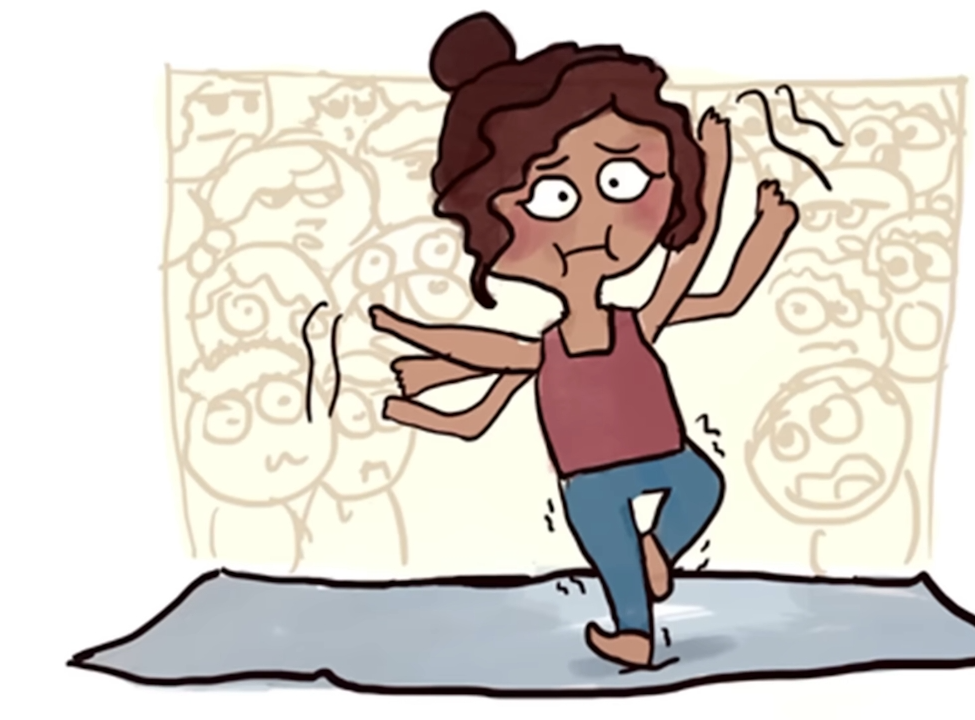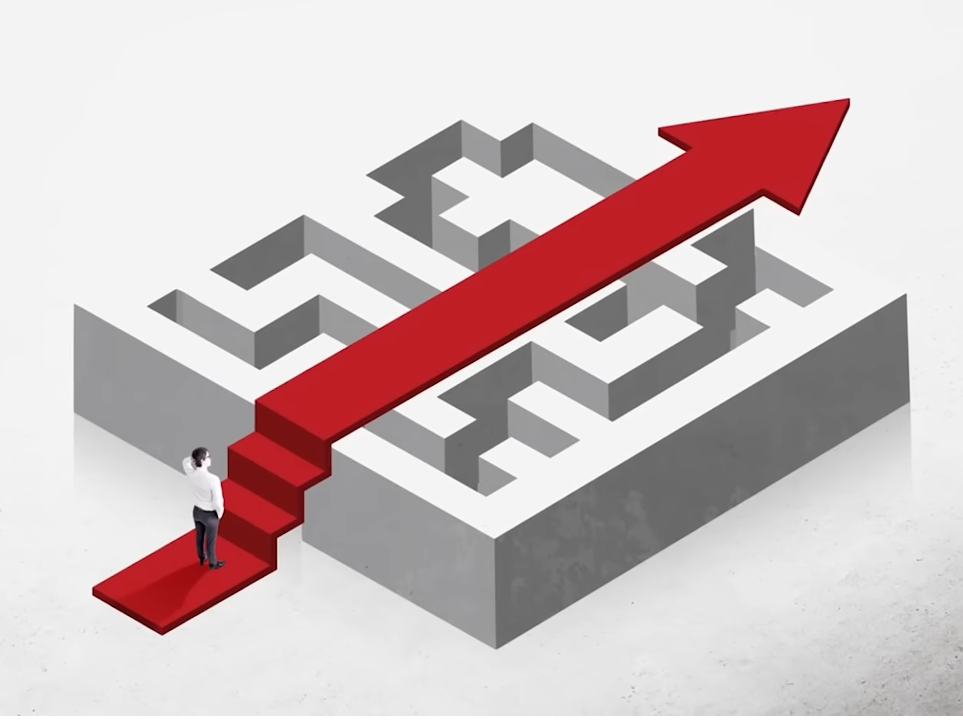1. Happy:

Then, you suddenly notice a group of cheerful models chatting in the corner of the room. You gently pass by them and suddenly hear small laughs. You think to yourself: "Oh, they're laughing at me". To address the worry, you find a place to stand at the back of the class where you think no one will notice you to start learning.
In the first lesson, the instructor asks the whole class to perform a fish-style bending exercise. This is the first time you've done that, so you couldn't hold it for long. Your back hits the mat in a quiet atmosphere while everyone is focusing on the fish pose. Reflexively, you look around to make sure no one saw your bump just now. As if to reassure you, you catch a slight smile on the lips of a boy next to you. "I knew it, everyone is laughing at me," you think to yourself again. At the end of the class, you leave without paying attention to anyone else and that's the last time you do yoga.
Confirmation bias is a phenomenon in that yoga class. You quickly walk through the class and look for evidence to reinforce your worry - the models, the boy next to you mocking your bump. But there is a bitter truth that you won't believe, that no one in that class cares who you are. When we believe that what we know is right, we tend to only seek and remember relevant information to prove our existing views without considering opposing opinions. This is called confirmation bias. This way of thinking happens unconsciously and affects your daily decision-making process, from small decisions like what to buy, what to eat, to bigger decisions like who to trust, what profession to pursue, how to express emotions, and even financial decisions. The influence of confirmation bias on behavior has three major effects: information search, perception of surrounding issues, and imagination.
Today you have to stay home alone. What to do when you're sad? Just browse Facebook. What's on Facebook? There are many things, you come across pictures of trips, parties with bright smiles on the walls of your friends' houses. You draw the conclusion that your friends are now living very successful and happy lives. Then, you think to yourself: "I am truly a lonely and failed person." Alone at home and feeling like a failure, it's all because you are looking for information to reinforce your negative thoughts that "I am a failure." Even though you know that looking at those pictures only makes you feel worse, you still like to do so.
2. Information:

There are two ways you understand the information you encounter. When it comes to processing neutral information, confirmation bias will make you only go in the direction that you believe is reasonable. For example, in a romantic relationship: you are deeply in love with a guy, and everything you see in him is perfect, like a real-life star. You overlook all his flaws. But when the beautiful relationship turns sour, what you see in him is a coffee-smelling mouth, rambling stories, and strands of hair in the bathtub, as if you care a lot about those things. So what happens? You are still in love with the same person, but your emotions determine how he is in your eyes.
Confirmation bias also affects memories of events in your past, making you explain and even "paint" them with reasons you believe are correct. In a classic study, Princeton and Dartmouth students were shown a match between the two schools. At the end of the match, Princeton students remembered more mistakes made by the Dartmouth team, and vice versa, Dartmouth students remembered more mistakes made by the Princeton team. Both groups of students believed that their team played better, so they tended to remember the positive aspects of their team and the negative aspects of the opponent to reinforce their beliefs.
Why do we fall victim to confirmation bias? It's because you are afraid to admit your opinion is wrong and worry that you will look foolish if you are wrong. Therefore, you tend to look for evidence to further reinforce your existing belief that you think is correct, as this is much easier than accepting conflicting information. For example, you always believe that you are a good person and your political views are correct. Evidence contradicting this belief will cause tension and discomfort in terms of perception, called cognitive dissonance. There are two ways to ease this discomfort: fight to prove you are right, or avoid facts that conflict with your thoughts.
The brain has a self-protective mechanism that helps you defend against opposing opinions to avoid mental harm, similar to how the body reacts to physical injury. When faced with a large amount of information, your brain will find the fastest way to solve the problem, leading you to easily search for information to reinforce your beliefs rather than evaluate opposing opinions.
3. Belief:

What is the solution? Always be curious and open to new things. When faced with a problem, don't focus on proving yourself right, as you may be led by confirmation bias. Break down barriers in thinking and experience more with an open mind, always selectively absorbing. When you dare to admit mistakes and failures, you give yourself the opportunity to learn something new and accept opposing opinions. This will help you broaden your perspective. A simple way is to accept as many opposing opinions from others as possible. Next time you decide to buy a house, ask a friend to play the role of a critic and persuade you not to buy that house. You will have the opportunity to see things you didn't notice before and make a more informed decision.
Confirmation bias is an unavoidable obstacle in the decision-making process, and you don't always overcome it. However, when making important decisions about health, love, or finances, try to minimize the influence of confirmation bias. Once you understand what confirmation bias is, you can limit the risks it poses and make more rational decisions. Finally, if you participate in a yoga class and fail in the fish-style bending exercise, there's no need to worry, because no one cares about you.
Confirmation bias, also known as "confirmation bias," is a common psychological phenomenon where people tend to seek, remember, and interpret information in a way that reinforces their existing beliefs, while ignoring or minimizing information that contradicts those beliefs. This bias deeply affects how we think, perceive, and act in many aspects of daily life. To better understand confirmation bias and its impact, we will explore how it influences the decision-making process, personal relationships, career, and mental health.
First, confirmation bias affects our decision-making process. When faced with an important decision, such as buying a house, choosing a new job, or financial investment, we often seek information to support our decision. However, due to confirmation bias, we tend to focus on information that supports our existing views and ignore or downplay conflicting information. This can lead to hasty and inaccurate decisions. For example, if you believe that the real estate market is on the rise, you will easily accept articles or reports predicting this growth, while ignoring warnings of a possible downturn. As a result, you may make a home purchase decision based on biased information, leading to financial risks.
Confirmation bias not only affects major decisions but also seeps into small daily decisions. Take choosing food as an example. Suppose you believe that a certain diet, such as vegetarian or keto, is best for your health. You will easily accept studies and articles praising the benefits of that diet and ignore studies pointing out its drawbacks or risks. This not only affects your health but also makes you close-minded to other choices that may be more suitable for your body and lifestyle.
4. Lifestyle:

Personal relationships are not immune to the influence of confirmation bias. When we love or have affection for someone, we tend to focus on their good points and overlook the bad ones. For example, in the early stages of a relationship, you may see your partner as perfect, all their actions are cute and lovely. However, as the relationship progresses and the flaws begin to show, you may feel disappointed and hurt because they no longer match the perfect image you once believed in. This happens because initially you let confirmation bias blur reality, focusing on the good points and ignoring warning signs.
Confirmation bias can also be harmful in family and friendships. If you have formed a negative opinion about a family member or a friend, you tend to only pay attention to actions and words that reinforce that opinion, ignoring their efforts or positive changes. This not only increases tension and conflict in relationships but also hinders development and reconciliation.
Our mental health is also strongly influenced by confirmation bias. When we have negative thoughts about ourselves, such as "I'm not good enough" or "I will never succeed," we tend to seek and remember events that reinforce those thoughts. This can lead to anxiety, depression, and decreased self-esteem. For example, if you have a bad day at work and feel you are not good enough, you will remember small mistakes and ignore praise or achievements.
Conversely, if you have a positive bias about yourself, you may easily overlook warning signs of your mental health. For example, if you always believe that you are very resilient and never have mental health issues, you may ignore signs of stress, anxiety, or depression until they become serious.
Finally, remember that confirmation bias is a natural part of human thinking. We cannot completely eliminate it, but we can learn to recognize and control it to minimize negative effects. By increasing awareness of confirmation bias and practicing critical thinking skills, we can make wiser decisions, build better relationships, and improve our mental health. This requires effort and perseverance, but the benefits it brings will surely be worth the effort.
